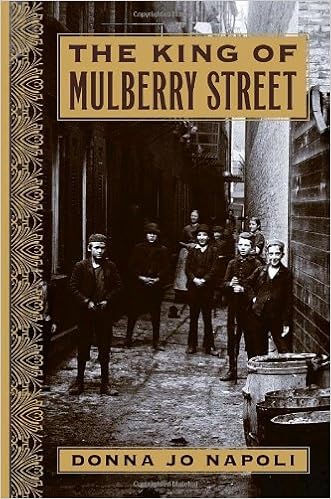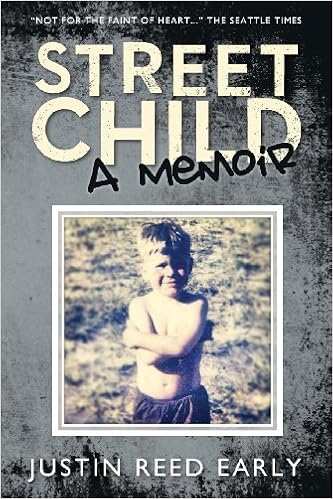 subtitle: Homeless Children as a Literary Genre
subtitle: Homeless Children as a Literary Genre
In my opinion, there should be a new genre added to the list, called
"street kids" or "homeless children". It would be a sub-genre to others,
such as memoirs and true life experience, for example, Justin Reed Early's
Street Child: A Memoir which I've downloaded and plan to read next, Fr. Joe Maier's
Welcome to the Bangkok Slaughterhouse, whom I had the privilege of working with in Bangkok; science fiction/cyberpunk, such as my own
Pepe; or current or historical fiction, such as Charles Dickens' Oliver Twist,
Fallen Angels: Stories of Los Gamines,
and, definitely not least, Donna Jo Napoli's The King of Mulberry
Street, which I've just finished reading. While accepting it as a
literary genre, however, let's be careful not to romanticise it too
much, remembering that these things really do happen to real children in
many parts of the world.
Whether historical, futuristic or
present, certain factors always remain the same. Human nature hasn't,
and will probably never change. Cruel opportunists exited in Dicken's
time, they exit now, and will exist in the future (judging by the way
things are going). Examples include the "padrones" in Dom Napoli's late
19th century New York, where they helped children to emigrate, but kept
them as slaves, working them on the streets. And what about futuristic
technology? The street kids are too busy trying to keep themselves fed
to worry about that, let alone afford any of it. If anything, it makes
their lives worse. Street kids of all ages don't even wear shoes -- with
the exception of Dom Napoli, whose mother thoughtfully bought him a
pair shortly before sneaking him on board a freighter to America.
When
I refer to Dom Napoli, I mean the main character of the narrative
written by author Donna Jo Napoli. Dom, the character, is a
nine-year-old Italian Jewish boy from Naples, and is based on what the
author, Donna, imagines her own ancestor to be (who emigrated at the age
of five). Like Donna's ancestor, Dom finds himself totally alone in
America. He chooses the surname of Napoli because that's where he's
from. He doesn't know a word of English, but he's heard that Mulberry
Street is where there are people who speak Italian with the Napoli
dialect. He follows a man whom he heard asking directions to Mulberry
Street, until he arrives there. Maybe, he hopes, he'll find an uncle he
knew to have emigrated there previously. He doesn't. Instead, he sleeps
in an old barrel not far from a dead dog -- at least no one bothers him
all night. But what next...?
Dom seems to be quite an intelligent
and resourceful boy for his age, and he actually makes it, and becomes
successful at selling sandwiches and helping out his friends. One might
be tempted to think that the story isn't very realistic on this point,
but it has happened before. At least the author's great-grandfather
survived on his own as a five-year-old immigrant and, although the
details of that are sketchy, did eventually start a similar business.
One rule of writing fiction is, "Truth is stranger than fiction" –
meaning that regardless of miracles that may happen in real life,
fiction has to remain believable. Donna Jo Napoli, at least, kept this
rule by making her main character a nine-year-old instead of a
five-year-old.
In a street kid's everyday life, there are plenty
of obstacles to overcome -- enough to fill up any literary genre. Life on the streets can be as dangerous as
jungle warfare, or laser battles in an alien landscape. There's plenty
of possible action to draw on. If anything, the writer's challenge is
deciding whether he/she has made it too easy on the main character, or
made life too dismal for the reader to enjoy -- I speak from experience.
In reality, some people do survive a childhood like that, but in fiction
there must be a balance between reality, believability, and maintaining
it as a pleasant read. Remember, “truth is stranger than fiction (and
must be kept so)”. On the other hand, I don't think any realistic story
about homelessness can be told without relating at least one tragedy, as
also happens in The King of Mulberry Street. Donna Jo Napoli has
handled all these factors like a pro.
As historical fiction goes,
Donna Jo also pulls it off well. Not only does she portray street life in
New York, but also nineteenth century Naples – including some things one
doesn't find in fiction. Back then, it was actually normal to see kids
skinny-dipping in the river or seaside both in Europe and in America, as
we also see from the paintings of that era, by the likes of Joaquin
Sorolla Bastida and George Wesley Bellows, and the photography of
Francis Sutcliffe. But one of the last things Dom's mother told him,
besides things like “Watch and learn”, “Get an education” and “Simply
survive”, was don't undress in front of other people. That was to hide
his circumcision, which would lead to another hazard of that age –
anti-Semitism. That, and keeping kosher is another of Dom's challenges
in the New World. Not only is he resourceful, but his vulnerability on
one hand, and his generous heart on the other, make him an endearing
character.
All of it is narrated from inside Dom's head. It's in
first-person past-tense, but it could have just as well have been
present tense. Donna Jo puts us right there in Dom's shoes. Yes, I get
it – he did have shoes.
 Subtitled: Time and Space Gymnastics
Subtitled: Time and Space Gymnastics










